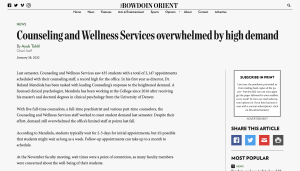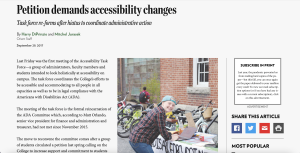
We focused on the class theme of college campus responses to student mental and physical health on campus. We specifically focused on Bowdoin College’s attempts over the years to address these concerns and pulled each of our articles featured in this section of the e-zine from the Bowdoin Orient.
- “Counseling and Wellness Services overwhelmed by high demand” (2022) By Ayub Tahlil

This article, written in January of 2022, gives the reader an overview of Bowdoin College’s counseling services and the most recent updates that have been made to improve them. Tahlil writes that Bowdoin employs five full-time counselors, a full-time psychiatrist, and several part time counselors to address student needs, but a sharp rise in demand over the past year has brought up questions of how to make these services more effective and accessible. As a result, Bowdoin has adopted an “urgent care” like model, which reduces wait times for students seeking counseling but requires them to participate in group therapy sessions prior to individual services. This has been a somewhat controversial shift, but seems to be encouraging some success.
This article is representative of our chosen theme of Bowdoin’s response to students with disabilities and student mental health because it specifically mentions the rise in demand of counseling services post-pandemic, which is something we discussed at length in class. As a result of the pandemic, student mental health at Bowdoin rose to the forefront of campus discourse with students and faculty alike demanding change and more accessible services. The debate over whether or not student mental health is an element of campus life that colleges are responsible for has not been full resolved, so Bowdoin, like other schools, has been making an effort to offer the right amount and quality of services. As a result of the pandemic, feeling rules surrounding student mental health has changed to the normalization of needing help and calling upon the college to provide it. As we continue to adjust to post-pandemic college life, these counseling services will most likely have to continue to adapt to a higher demand of services as a generation of quarantined, isolated young adults enter the college sphere.
2. “Petition demands accessibility changes” (2017) By Harry DiPrinzio and Mitchel Jurasek

This article by DiPrinzio and Jurasek details the petitions and other work done by students and faculty at Bowdoin to make the campus more physically accessible during the 2017 school year. It discusses the creation of the “Accessibility Task Force”, or a group of faculty and students responsible for identifying where and how Bowdoin should improve to make the campus more accessible. The biggest area they focused on was making every building wheelchair accessible, but also have tackled issues such as creating a testing center for those who need academic accommodations and granting academic credit for sign language courses. The students successfully created a petition with these and other demands with over 700 signatures and gave it to President Rose that summer.
This article relates to our theme of student mental and physical health on college campuses because we have discussed in class the extra emotional labor that disabled people must do in order to function in a predominately able-bodied-prioritizing society. Within the task force, students had to undergo more emotional labor to request the services they needed to thrive at the rate of their able-bodied peers. This idea brings into question sympathy margins afforded to and by disabled students, as they must, for example, provide sympathy to peers who perhaps have never thought about how a building on campus was not wheelchair accessible. At the same time, able-bodied students could possibly increase their sympathy margins for their disabled peers once they learn about how inaccessible the campus was prior to these reforms. As we have learned by reading Cahill and Eggleston’s work on wheelchair users, disabled people in public enact many forms of emotional labor in order to “blend in” with that setting, such as using humor, masking their emotions to make others feel better, and other strategies. This is most certainly the case on Bowdoin’s campus, hence why this petition was made and why the school has made so much progress since.
3. “Navigating Bowdoin as a Transgender Athlete” (2017), by Anjulee Bhalla

This article details the journey of one transgender male athlete as he navigated his transition both within his sport, but also within the larger Bowdoin community. Jake was a member of the Bowdoin Women’s Hockey team before transitioning, and decided to act as a student-coach during his senior season rather than playing because he really wanted to start taking hormones that year rather than wait until post-graduation. He attributes his overall positive experience with coming out and transitioning as a student-athlete to his supportive friends, coaches, teammates, and the athletic department as a whole.
Jake’s story speaks to our theme by calling attention to the importance of support and resources for students on campus. The success of Bowdoin for Jake in creating an inclusive space encouraged him to embrace his true self and enabled him to feel accepted and valuable. This reduced the amount of emotional labor he would have had to perform if his teammates, for example, expressed disapproval of his presence in the locker room, or his male friends’ disapproval of him using the men’s bathroom. The emotional labor of making his friends and teammates feel more comfortable around him would most likely have detracted from his overall positive experience while transitioning, which can have detrimental effects on one’s mental health and be exhausting as we have learned in class. Tiring emotional labor done to make others more comfortable all while trying to navigate exclusive spaces was something we specifically discussed in relation to wheelchair users in class and in earlier in this section of the e-zine, but can undoubtedly extend to transgender students on campus. Thus, the effort of Bowdoin athletics to make Jake feel accepted, loved, and that there was a place for him, even if not on the ice, aided him in an overall positive transitioning experience.